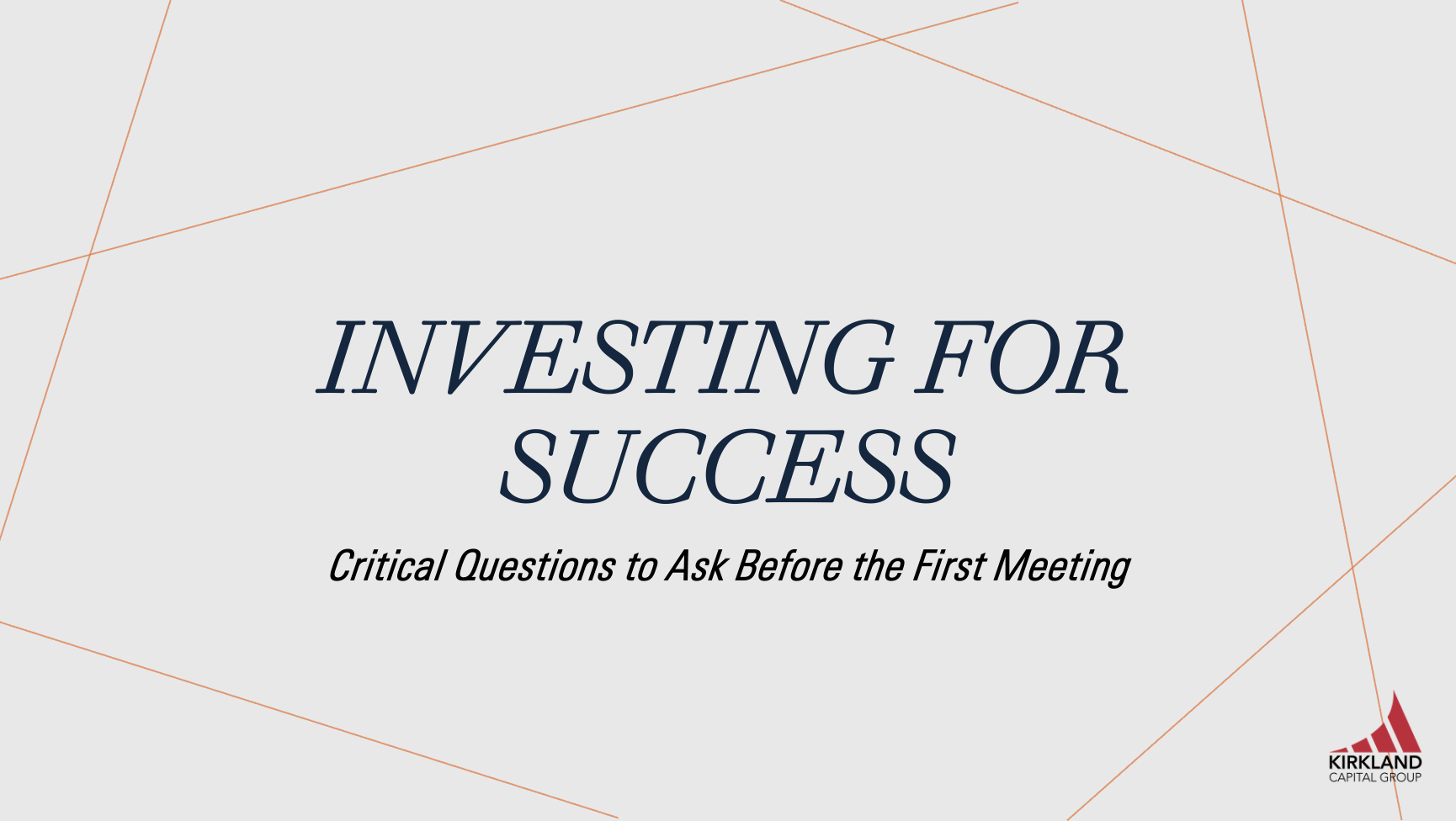Investing for Success: Determining Your Non-Negotiables
Have you ever embarked on a journey without a clear destination, feeling both excited and apprehensive about the unknown ahead? It might sound like a strange question, since most people plan their journeys with clear destinations in mind, right? However, many investors find themselves in this exact scenario—venturing into the world of investments without a defined path. But what if there was a way to start this complex journey with clarity and confidence?
At Kirkland Capital Group, we believe that one of the keys to successful investing lies in determining your non-negotiables before investing. But what exactly are these non-negotiables, and how can they simplify your due diligence efforts? The answers to these questions hold the power to transform your investment strategy.
In this video, we delve into the essential aspects you need to focus on when formulating your non-negotiables. Drawing from personal experiences and insights, we reveal the secrets that can enhance your effectiveness in achieving your specific investment goals.
Are you ready to uncover the mysteries of successful investing? You can also dive into the article below the video to discover the key points and unlock the knowledge that will guide you on your investment journey. Don't miss out—watch or read on, and invite others to join you in this enlightening exploration.
Why Non-Negotiables Matter
Before diving into any potential investment, it's essential to have a clear set of criteria—your non-negotiables—that a prospective investment must meet. These criteria ensure that your investments align with your objectives, helping you maintain focus, consistency, and ultimately achieve your goals. By honing in on what's non-negotiable for you, you're able to eliminate unsuitable options quickly and focus your energy on investments that truly meet your standards.
“It’s essential to have a clear set of criteria—your non-negotiables—that a prospective investment must meet.”
Developing Your List
Your investment journey should start with identifying your investment strategy and personal objectives. A clear, focused strategy prevents distraction and helps you concentrate on assessing the right opportunities for your portfolio.
Core Areas of Focus
1. Track Record and Performance
It's fundamental to validate that the track record of an investment aligns with your expected returns and acceptable levels of risk. Consider if the returns are consistent and how they compare against benchmarks. Equally important is understanding the volatility of those returns, especially when you require regular liquidity.
“It’s fundamental to validate that the track record of an investment aligns with your expected returns and acceptable levels of risk.”
2. Assessing the Management Team
People drive investment success. Dive deep into understanding the management team's experience, their unique advantage or 'edge,' and whether they have robust processes and procedures in place. An anecdote from my career: a firm had a brilliant concept but was led by managers with poor personal financial histories, which led to operational inefficiencies and fund mismanagement—two critical red flags.
3. Risk Management
Non-negotiables around risk management are personal. You must specify intolerable risks and ensure that managers comprehend and mitigate these risks effectively. Despite the need for risk to realize returns, it's crucial to determine if managers have navigated previous market cycles successfully and how they handle adverse conditions.
4. Service Providers
Trustworthy service providers, including fund administrators and auditors, are essential for ensuring operational transparency and reliability. If a fund lacks these infrastructure elements, reconsider your involvement. This non-negotiable was a lesson learned early in my career, where the absence of independent verification led to dire investment outcomes.
“The importance of service providers was a lesson learned early in my career, where the absence of independent verification led to dire investment outcomes.”
5. Fee Structure
Understand the fee structure in relation to the complexity of the strategy and the returns expected. Transparent communication on all fees is critical. I've encountered investors unaware of all potential fees involved, which impacted their expected net returns significantly.
6. Liquidity
Establish liquidity needs according to your investment horizon and ensure the fund's terms align with these needs. This is particularly crucial in stress scenarios, where liquidity can become constrained.
“Establish liquidity needs according to your investment horizon and ensure the fund’s terms align with these needs”
7. Regulatory Compliance and Transparency
Never compromise on regulatory compliance. Ensure your investments operate within the legal framework and are transparent about their operations. This non-negotiable mitigates the risk of unsuspected operational disruptions.
8. Fund Size
Align fund size with your objectives. Smaller funds might offer higher returns due to nimble strategies, while larger funds might mitigate risks better but potentially offer returns closer to standard market indexes.
9. Impact and ESG Considerations
Determine whether your investments should have an additional impact, such as adhering to Environmental, Social, and Governance (ESG) principles. This can be a straightforward yes or no but is essential for many investors today.
Actionable Steps
Creating a checklist based on these non-negotiables is an excellent way to start each investment assessment. Remember, flexibility is key as your financial situation or market conditions evolve. Having a structured approach with room for adaptation ensures you remain on track while adjusting to new insights or changing circumstances.
Your Path Forward
Establishing investment non-negotiables is indispensable for investors aiming to navigate the complex world of alternative investments with precision. It paves the way for a disciplined and efficient due diligence journey, preventing oversight and ensuring alignment with your unique goals.
Want to discuss this further? Schedule a call with me. You also have the option to access the presentation that was featured in the video, along with additional slides containing recommended questions to pose for each specific area of focus.

